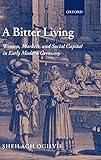Sheilagh Ogilvie "A Bitter Living. Women, Markets, and Social Capital in Early Modern Germany "
Description
What role did women play in the pre-industrial European economy? Was it brought about by biology, culture, social institutions, or individual choices? And what were its consequences - for women, for men, for society at large? Women were key to the changes in the European economy between 1600 and 1800 that paved the way for industrialization. But we still know little about this female 'shadow economy' - and nothing quantitative or systematic.This book tackles these questions in a new way. It uses a unique micro-level database and rich qualitative sources to illuminate women's contribution to a particular pre-industrial economy: the German state of Wurttemberg, which was in many ways typical of early modern Europe. Markets expanded here between 1600 and 1800, opening opportunities outside the household for both women and men. But they were circumscribed by strong 'social networks' - local communities and rural guilds with state support. Modern political scientists have praised social networks for generating 'social capital' - shared norms and collective sanctions which benefit network insiders, and sometimes the whole society. But this book reveals the dark side of 'social capital': insiders excluded and harmed outsiders, especially women, to the detriment of the economy at large.
Early modern European economies differed widely in their restrictions on the role of women. But the monocausal approaches (technological, cultural, institutional) that dominate the existing literature cannot explain these differences. This book proposes an alternative approach driven by the decision individual women themselves made as they negotiated a wide array of constraints and pressures (including technological, cultural, and institutional ones). We are not only brought closer to the 'bitter living' pre-industrial women scraped together , but find out how it came to be so bitter, and how restrictions on women inflicted a bitter living on everyone.
Reviews"Both theoretically and empirically rich, Shelaigh C. Ogilvie's formidable and oftentimes brilliant study addresses fundamental questions concerning the social, political, and--most importantly--economic status of women in early modern central Europe. A major contribution to the identification and interpretation of women's and men's distinctly different patterns of work, her findings deserve the broadest possible discussion and should greatly stimulate future research."--American Historical Review
"...an impressive work with impressive findings and convincing arguments. It should not only be read by students of gender and/or economic history, but by all who care about social inequities."--Maria R. Boes, West Chester University
Product Details
416 pages; 58 tables & figures; ISBN13: 978-0-19-820554-8ISBN10: 0-19-820554-6
About the Author(s)Sheilagh Ogilvie, Reader in Economic History, University of Cambridge
17〜18世紀のヴュルテンベルクの二つの村のギルドと女性の労働について量的、質的に徹底的に分析したらしい本です。Po-Chia Hsia の書評を読む限りでは、かなり凄そうな感じです。150年分の教会裁判の記録7000枚を読んで、分析したらしいです。とても人間業とは思えません・・・・・。

A Bitter Living: Women, Markets, and Social Capital in Early Modern Germany
- 作者: Sheilagh Ogilvie
- 出版社/メーカー: Oxford Univ Pr on Demand
- 発売日: 2003/08/07
- メディア: ハードカバー
- この商品を含むブログ (1件) を見る

Germany: A New Social and Economic History 1450-1630
- 作者: Robert W. Scribner
- 出版社/メーカー: Hodder Education
- 発売日: 1995/10/27
- メディア: ペーパーバック
- この商品を含むブログ (1件) を見る
また彼女が2巻と3巻を執筆している、三巻本のドイツ経済史のの概説書が出ているようです。